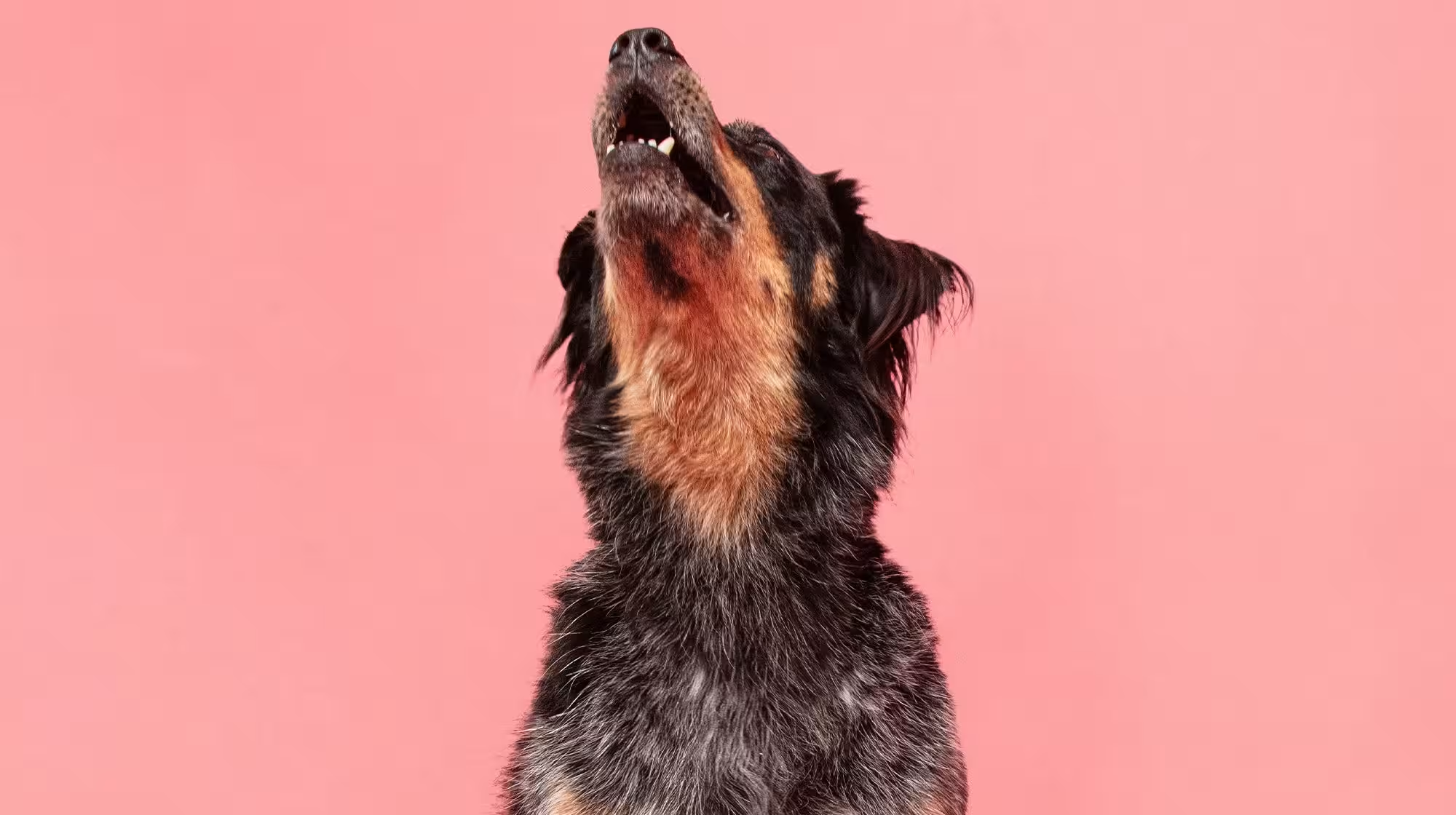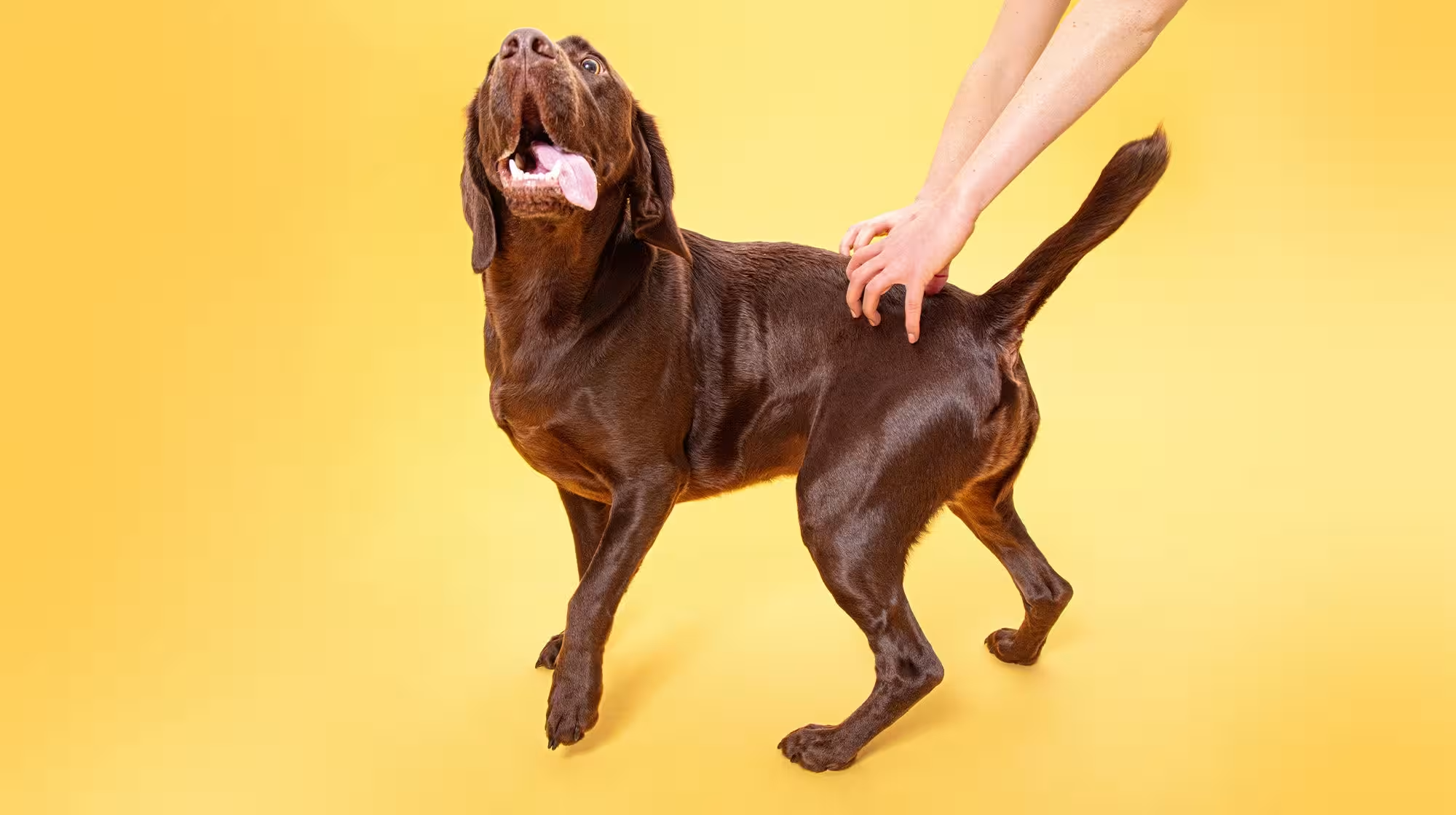Jealousy is pretty common in dogs, and often manifests as being possessive and showing jealousy towards other dogs and people.
However, it can sometimes develop into a deeper problem, especially when it results in discomfort for your dog or signs of aggression towards others.
If your pooch is needy for your attention when other pets and people are around, or if your dog is struggling to accept a new baby, person or animal in the house, here are some ways to identify and reduce the jealous behaviour before it gets worse.
Signs of jealousy in dogs
If your pooch is feeling jealous, they will likely show it in the following ways when in the company of a ‘competing’ person or animal:
Pushing in between you. When you’re interacting with another person, dog or pet, your jealous dog will force themselves between you in a ‘wedging’ action, as if trying to separate you and make themselves the focus.
Blocking you from others. They may also lie at your feet to ‘block’ access to you; this also claims you as their own.
Whining, barking and growling in order to get your attention when you’re interacting with someone else.
Getting as close as possible to you - like trying to sit closely against you or on your lap, putting their head on you or licking your hands or face.
Sulking or withdrawing. Your pooch might hide in another room or lower their head and body to show their displeasure with the situation.
Being possessive of toys and belongings. Your dog might usually be quite laid-back, but they may show sudden possessiveness over their toys, blankets or possessions and growl if you or someone else goes near them.
Misbehaving. When feeling jealous, your usually well-behaved pooch may seem in an aggressive or destructive mood, chewing and scratching at things and antagonising you or others around you. They may even poop or pee indoors to be purposely naughty. This is to get your attention, but also to release their built-up anxiety or agitated energy.

Why do dogs get jealous?
They want to be the focus of all your attention!
You are your dog’s whole world, and they want the same treatment in return! Of course, this isn’t always plausible, and when you’re paying attention to others such as visitors, a partner, a new dog or new baby, this is when jealous behaviour can be triggered.
Though we can’t be sure dogs feel the same jealousy that humans do, they can feel competitive around another person or pet and will try to claim ownership of you.
What can make a dog show signs of jealousy?
Dogs will often show jealousy because they feel they have ownership of you.
They may do this by guarding or protecting you when there is no real threat, playing up when you’re giving attention to somebody else, or when there’s a new person or pet in their home (i.e. their territory) causing them to feel threatened and/or neglected.
Common scenarios for dogs to get jealous include:
When a new baby arrives
You introduce a new dog, puppy or other pet
When you’re meeting/showing affection to another person’s dog
When a new person, like a romantic partner, starts coming to the house or moves in
When you hug or sit close to your partner
Can jealousy in dogs be a problem?
Yes, sometimes - if your pooch gets particularly aggressive to show their jealousy, it can become dangerous.
It’s normal for dogs to show some possessiveness or attention-seeking behaviours around new dogs or people; however, if your pooch lashes out with biting, snarling or fighting, you might want to talk to a pet behavioural therapist or dog trainer about ways to reduce their jealousy.
Are some dog breeds more prone to jealous behaviour?
Yes, some dogs are prone to possessiveness - usually those that are somewhat clingy and have strong attachments to their owners.
Dogs that form very strong attachments include:
Labradors
Golden Retrievers
Border Collies
Pugs
Vizslas (known for being a ‘velcro’ dog!)
Maltese
Greyhounds
Remember, however, that all dogs are capable of showing possessive or jealous behaviour.

Is it normal for dogs to be jealous of other dogs?
It’s common for a dog to feel distrustful towards another dog in (what they perceive to be) their territory.
Dogs are territorial animals, and though they are often friendly and playful with each other, dog behaviour is largely about dominance.
Depending on your dog’s temperament, this means they might immediately show jealousy, possessiveness or aggression when a new dog is introduced, either out on a walk, in your home or in someone else’s home.
Though it’s common, it can be stressful trying to predict what your dog will do in these scenarios, so you can take steps to try to prevent this jealous behaviour.
How to stop jealous behaviour in dogs
If you think your dog is acting out because of jealousy, let’s go into some ways you can reduce these behaviours:
Boundary training. Reduce your dog’s jealous streak with specific behavioural training. If you’ve already trained your dog in boundaries, keep repeating your commands for being calm and staying back (‘Settle’, ‘Stay’, ‘Sit’, etc.); and reward your pooch when they retreat and stay calm.
Don’t react to jealous behaviour. Aside from using training commands to calm your pooch or offering them a toy or non-food distraction, don’t react to your dog’s jealous behaviour. If you drop what you’re doing to give them attention, or you calm them by petting them, they’ll learn that playing up works.
Keeping your dog calm. If you know something might trigger possessiveness in your pooch, get them prepared ahead of time. A calm, happy dog is less likely to act out, so be sure they’ve slept well, been on a walk and eaten a healthy, balanced meal. All of these steps will regulate their mood, so you can introduce a new dog or person knowing they’re already feeling at ease.
Include everyone in new routines. If a new person, baby or pet is going to be permanently in your home, create routines that will include them and your dog. If they've previously shown signs of being calm, let your pooch say hello to a new baby each morning, or have your dog near your baby when you play together. If there’s a new partner in the house, bring them along to every dog walk at first, or have your partner feed the dog at meal times. Soon, your pooch will understand that the newbie is part of the household.
Give pets equal attention. If there’s a new dog in the house that triggers your pooch’s jealousy, are you playing favourites? If, for whatever reason, you’re giving one dog more attention than the other, try to balance your interactions and give equal attention to all dogs. This is especially relevant if your new pooch is a puppy that needs a lot of your time - your older dog may start to feel the lack of love from you. Make a special effort day-to-day to remind them they’re important.
Offer distractions. Offer things for your dog to do if you feel they’re becoming jealous, like a puzzle or long-lasting dog chew, their favourite toy or comfort blanket. Don’t drop everything to pay full attention to your dog as this rewards the jealous behaviour, but if they forget they’re jealous because they’re playing with a puzzle or toy, this can help
Reward your dog for being calm and correcting behaviour. If you repeat your ‘settle’ commands each time your dog acts up due to jealousy, and they listen and stay back, reward them for obeying you. Offering them a healthy dog treat or two builds a positive association, so they’ll know it’s a good thing to stay calm when they feel like butting in between you and somebody else.
Treats
Delicious treats that taste good & do good too – perfect for dogs of all ages. Looking for something puppy-friendly? Check out our puppy treats collection.
-

 from
fromCurrent price: £3.99
Calming Postbiotic Meaty Treats -

 from
fromCurrent price: £3.99
Health & Digestion Postbiotic Fish Treats -

 from
fromCurrent price: £11.49
Dental Stick Bundle For Dogs -

 from
fromCurrent price: £10.49
Meaty Treats Taster Pack -

 from
fromCurrent price: £3.99
Lovestruck Lamb Postbiotic Meaty Treats -

 from
fromCurrent price: £3.99
Calming Dental Sticks For Dogs -

 from
fromCurrent price: £3.99
Peanut Butter Dental Sticks For Dogs -

 from
fromCurrent price: £4.99
Long-Lasting Fish Hide Chews -

 from
fromCurrent price: £4.99
Calming Fish Hide Chews -

 from
fromCurrent price: £8.49
High Protein Beef Jerky -

 from
fromCurrent price: £9.50
Fish Chews Bundle -

 from
fromCurrent price: £3.99
Spirulina & Mint Dental Sticks For Dogs -

 from
fromCurrent price: £3.99
Cheddar Cheese Dental Sticks For Dogs -

 from
fromCurrent price: £3.99
Skin & Coat Postbiotic Meaty Treats -

 from
fromCurrent price: £3.99
Dental Postbiotic Meaty Treats -

 from
fromCurrent price: £3.99
Peanut Butter Postbiotic Nutty Treats -

 from
fromCurrent price: £3.99
Cheddar Cheese Postbiotic Treats -

 from
fromCurrent price: £7.50
Peanut Butter Bundle -

 from
fromCurrent price: £7.50
Cheddar Cheese Bundle
Can jealousy be trained out of dogs?
Yes, in a lot of cases.
You must train your pooch to stay back and remain calm whenever they feel needlessly threatened or possessive, with commands such as ‘Settle’, ‘Back’, ‘Stay’ or whatever your command is to to calm your dog.
Reward them with healthy dog treats whenever they obey your commands, and eventually the positive association should stick.
When to see a vet
If you struggle to reduce your dog’s jealous behaviour, and none of the above suggestions seem to make a difference, it’s probably a good idea to chat to your vet or a dog behavioural therapist. They can offer advice or training for your specific dog’s temperament and lifestyle.
FAQs
Will my dog be jealous of a new dog or puppy?
They might be - especially if you’ve had one dog for a while and they’ve had you all to themselves.
If you sense any jealousy when you have a new dog, make sure you’re showing equal love and attention to all of your dogs, and build routines in which all dogs feel valued and important.
Encourage play and games together and give lots of praise so your dog understands: this new pooch is not a threat, and you have enough love to go around!
Is my dog jealous of my new partner?
If your dog seems very wary of a new person in the house, or jumps on you when your partner hugs or kisses you, these are sure-fire signs of jealousy.
Your pooch is prone to believe they deserve all your attention, and another human receiving affection from you may send them into possessive mode.
Can dogs be possessive of their owners?
Yes, some dogs can be possessive of their owners.
They usually show this by being clingy, aggressive towards other people or dogs, misbehaving for attention, or sitting and wedging themselves between you and the other person or animal.
Strengthening your dog’s boundaries through training, and giving all your pets an equal amount of love and attention, can reduce your dog’s jealous behaviour.
Are male or female dogs clingier to their owners?
There isn’t really any scientific evidence that male or female dogs are clingier or more prone to jealous behaviours - it’s really more about genetics, personality, temperament and the dog’s upbringing.
However, unneutered males are likely to be more territorial, so they might bark at unknown people or dogs and guard their owners more aggressively.
Help your dog feel calmer and happier with a nutritious grain-free diet for dogs. Our balanced meals for dogs use organic whole proteins and delicious fresh veg as well as powerful supplements, and our healthy dog treats are bursting with probiotics and lip-smacking meaty flavours.












